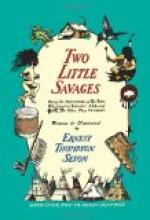II
Sam
Sam Raften turned out to be more congenial than he looked. His slow, drawling speech had given a wrong impression of stupidity, and, after a formal showing of the house under Mr. Raften, a real investigation was headed by Sam. “This yer’s the paaar-le-r,” said he, unlocking a sort of dark cellar aboveground and groping to open what afterward proved to be a dead, buried and almost forgotten window. In Sanger settlement the farmhouse parlour is not a room; it is an institution. It is kept closed all the week except when the minister calls, and the one at Raften’s was the pure type. Its furniture consisted of six painted chairs (fifty cents each), two rockers ($1.49), one melodeon (thirty-two bushels of wheat—the agent asked forty), a sideboard made at home of the case the melodeon came in, one rag carpet woofed at home and warped and woven in exchange for wool, one center-table varnished (!) ($9.00 cash, $11.00 catalogue). On the center-table was one tintype album, a Bible, and some large books for company use. Though dusted once a week, they were never moved, and it was years later before they were found to have settled permanently into the varnish of the table. In extremely uncostly frames on the wall were the coffin-plates of the departed members of the family. It was the custom at Sanger to honour the dead by bringing back from the funeral the name-plate and framing it on a black background with some supposed appropriate scripture text.
The general atmosphere of the room was dusty and religious as it was never opened except on Sundays or when the parson called, which instituted a sort of temporary Sunday, and the two small windows were kept shut and plugged as well as muffled always, with green paper blinds and cotton hangings. It was a thing apart from the rest of the house—a sort of family ghost-room: a chamber of horrors, seen but once a week.
But it contained one thing at least of interest—something that at once brought Sam and Yan together. This was a collection of a score of birds’ eggs. They were all mixed together in an old glass-topped cravat box, half full of bran. None of them were labelled or properly blown. A collector would not have given it a second glance, but it proved an important matter. It was as though two New Yorkers, one disguised as a Chinaman and the other as a Negro, had accidently met in Greenland and by chance one had made the sign of the secret brotherhood to which they both belonged.
“Do you like these things?” said Yan, with sudden interest and warmth, in spite of the depressing surroundings.
“You bet,” said Sam. “And I’d a-had twice as many only Da said it was doing no good and birds was good for the farm.”
“Well, do you know their names?”
“Wall, I should say so. I know every Bird that flies and all about it, or putty near it,” drawled Sam, with an unusual stretch for him, as he was not given to bragging.




